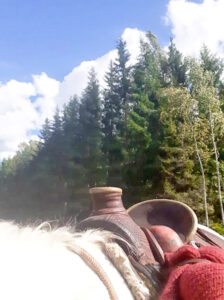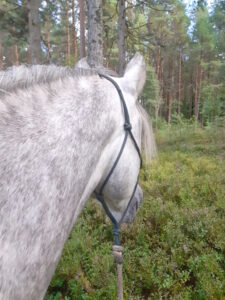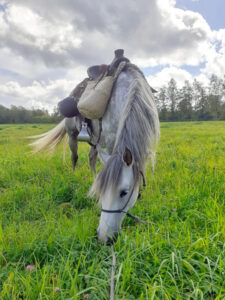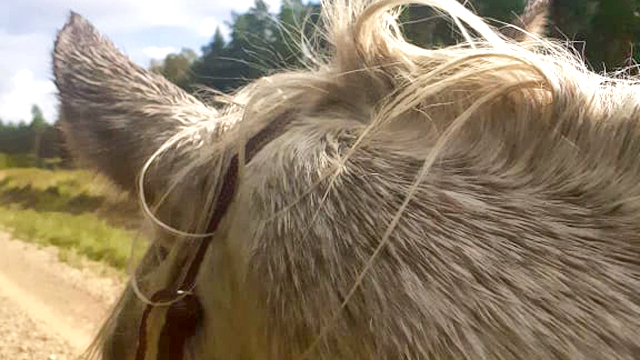I’ve been sitting on the couch all morning, reading, studying, writing some messages, thinking about some of the horses I have in training. All morning? Who has time for that? Yes, all morning, because I spent time in the barn till late last night.
There was a full moon. Even though I work for myself now and decide myself how to fill the days, deciding myself when I sleep and when I work, I feel the need to excuse myself. There’s always that part plagued by guilt, by pointing fingers and “I shoulds”. How dare I, spending a morning in when the days are getting shorter? When there are 8 colts to gentle and 3 to start and another 5 waiting across the road in another field, and oh yes, that one on the back burner that needs to be ready to sell?
I think perhaps these are some of the feelings and thoughts every serious student of horsemanship is plagued by from time to time. Perhaps they are more persistent in the minds of those of us who are younger. Mine are ingrained. I make it a habit to consciously examine them for truth.
 Tracing them back I find myself back at the riding school of my youth. I started going there when I was ten. I soon went every day after school. Before I knew it I was part of the furniture, as a Dutch saying goes, and took great pride in it. The rules were never explained or overtly stated. The ranks however, and the way “up”, was clear: you’d be taken more seriously if you spent more time there. You were supposed to help out mucking whenever you could. Lateness was not appreciated. People might not speak to you if you were late, or didn’t show. The feeling of being ignored was worse than being told off. If you proved yourself, chances were you might be rewarded in certain ways to make the other girls envy you: you might be allowed to ride in a lesson for more advanced riders, ride certain horses, go along on one of the wedding processions and stand in front of the carriage horses looking after them as the couple got married in the town hall. You might. You might not. You had to be ready.
Tracing them back I find myself back at the riding school of my youth. I started going there when I was ten. I soon went every day after school. Before I knew it I was part of the furniture, as a Dutch saying goes, and took great pride in it. The rules were never explained or overtly stated. The ranks however, and the way “up”, was clear: you’d be taken more seriously if you spent more time there. You were supposed to help out mucking whenever you could. Lateness was not appreciated. People might not speak to you if you were late, or didn’t show. The feeling of being ignored was worse than being told off. If you proved yourself, chances were you might be rewarded in certain ways to make the other girls envy you: you might be allowed to ride in a lesson for more advanced riders, ride certain horses, go along on one of the wedding processions and stand in front of the carriage horses looking after them as the couple got married in the town hall. You might. You might not. You had to be ready.
From the vantage point of most healthy adults this sounds like it wasn’t all that much fun. Not exactly an environment you’d want your child to hang out in either. But it didn’t feel like that to the mind of the teenager who needed to belong. I felt like I mattered. It wasn’t all bad. I learnt to work hard, to have perseverance, to show up for something that you care about even when it isn’t easy. An attitude of discipline and a work-ethic was instilled in me that helped me throughout my life. All good qualities. Being around horses was the best feeling I knew.
 When we, the other girls and myself, got older, we realised that certain things were expected, but again, not said out loud: we were expected to flake out, to stop coming every day, to stop riding, as soon as our interest in boys grew. It was true. Most of the girls stopped coming as frequently around the age of 15. Not so nice things were said about them. I worked harder to show how dedicated, how committed I was. If I learnt one thing, it was how to please my teachers, to try to do what I wasn’t really sure about, so that I would be seen, appreciated.
When we, the other girls and myself, got older, we realised that certain things were expected, but again, not said out loud: we were expected to flake out, to stop coming every day, to stop riding, as soon as our interest in boys grew. It was true. Most of the girls stopped coming as frequently around the age of 15. Not so nice things were said about them. I worked harder to show how dedicated, how committed I was. If I learnt one thing, it was how to please my teachers, to try to do what I wasn’t really sure about, so that I would be seen, appreciated.
There was some innocent disobedience too. After the film The Horse Whisperer came out, me and my best friend Karen watched and rewatched it, many times. We were mesmerised by the scene where Tom Booker lays down Pilgrim. We didn’t know who the stand-in actor was. We dreamed of Montana. We pretended to ride in endless Montana fields and practised the lead changes we had never ridden with our bikes. At the riding school we’d experiment with some bits of hooking horses on to us on the ground if we thought no one saw us. Even though it was never said, we felt like this horse whispering stuff was probably not allowed.
Ultimately I went to University and for some years, horses weren’t a part of my life. When I started back on my horse journey I was in my late twenties. I now held a Masters degree. To learn about the horsemanship though, I quickly realised I wasn’t going to get better quicker because of my booksmarts. The practical experience, the boots-in-the-mud immersion, the letting go of all that I thought I knew, was necessary. And I wasn’t afraid of doing the work. What I discovered was that the will to please the teachers was there, somewhere in me, just the same, just as strong as it had been when I was ten. I derived most of my self-worth from that will to please. How ridiculous, how immature, how unhealthy.
 I ended up doing a number of working studentships around the world. It is hard to submit yourself to the teaching of different teachers who all maintain different standards. It’s hard not to take it personal when you want to get better at something so bad. It’s hard having chosen a career and a career field where there isn’t any certainty whatsoever, and where you need all the help you can get. So you change your standards accordingly, so you can learn. You try to pick up on unspoken rules and certain cultural codes regardless of what the science might say…”We don’t pick out the hooves of our horses here before we ride.” vs. “Hey, why don’t you pick out your horse’s feet, don’t you respect him?” You do the best you can. You go through more than one ego-stripping experience, and in some ways come out better for it. You are actually getting better. The horses show for it. You know that before you are 50 and have 20 years of experience under your belt, you are not going to be shown the respect that some of your peers have been able to enjoy and take for granted since the start of their, very different, careers. Not the pay either. It doesn’t seem to help that you are a woman. But hey, stop playing the victim here, snap out of it, just get back to work.
I ended up doing a number of working studentships around the world. It is hard to submit yourself to the teaching of different teachers who all maintain different standards. It’s hard not to take it personal when you want to get better at something so bad. It’s hard having chosen a career and a career field where there isn’t any certainty whatsoever, and where you need all the help you can get. So you change your standards accordingly, so you can learn. You try to pick up on unspoken rules and certain cultural codes regardless of what the science might say…”We don’t pick out the hooves of our horses here before we ride.” vs. “Hey, why don’t you pick out your horse’s feet, don’t you respect him?” You do the best you can. You go through more than one ego-stripping experience, and in some ways come out better for it. You are actually getting better. The horses show for it. You know that before you are 50 and have 20 years of experience under your belt, you are not going to be shown the respect that some of your peers have been able to enjoy and take for granted since the start of their, very different, careers. Not the pay either. It doesn’t seem to help that you are a woman. But hey, stop playing the victim here, snap out of it, just get back to work.
My little dog likes to sleep in. I love the time I get with her on the sofa with me. Her smell and contented sighs against my thigh, her little head resting on my lap. Mornings in are the best. I look out the window. The horses are standing peacefully around a hay bale, chewing. They will be there in two hours too, just as well. I will only look to please them today.


